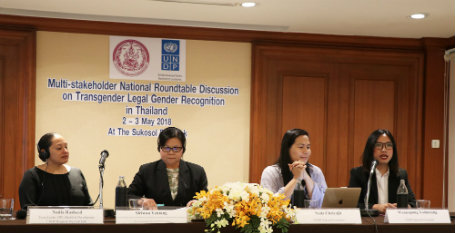New study by the United Nations Development Program (UNDP) finds marginalization of transgender in Thailand continues.
Transgender people in Thailand continue to be marginalized and excluded due to a lack of legal protections, a new study by the UNDP launched this month has found.
The failure to officially recognize a person's gender identity, including name and gender marker, in public registries and key identity and citizenship documents affects the ability of transgender people to navigate daily life, according to the report Legal Gender Recognition in Thailand: A Legal and Policy Review, launched at a national level meeting in Bangkok on May 2.
"In Thailand, the Department of Women's Affairs and Family Development recognizes the different challenges faced by people whose gender identity do not match their sex assigned at birth," said Lertpanya Booranabundit, Director General, Department of Women's Affairs and Family Development.
"We hope that the findings of the joint study released today, Legal Gender Recognition in Thailand: A Legal and Policy Review, and inputs from this multi-stakeholder meeting can serve as a valuable resource to influence policies that will protect the rights of transgender people."
The new study, jointly developed by UNDP and the Department of Women's Affairs and Family Development, illustrates how the absence of a law that enables transgender people to change their title, sex or gender on official documentation can affect access to health and social services, job applications, banking, and education.
The absence of adequate legal recognition and protections increases vulnerability to discrimination and violence, the report states.
Transgender people in Thailand continue to be marginalized and excluded due to a lack of legal protections, a new study by the UNDP launched this month has found.
The failure to officially recognize a person's gender identity, including name and gender marker, in public registries and key identity and citizenship documents affects the ability of transgender people to navigate daily life, according to the report Legal Gender Recognition in Thailand: A Legal and Policy Review, launched at a national level meeting in Bangkok on May 2.
"In Thailand, the Department of Women's Affairs and Family Development recognizes the different challenges faced by people whose gender identity do not match their sex assigned at birth," said Lertpanya Booranabundit, Director General, Department of Women's Affairs and Family Development.
"We hope that the findings of the joint study released today, Legal Gender Recognition in Thailand: A Legal and Policy Review, and inputs from this multi-stakeholder meeting can serve as a valuable resource to influence policies that will protect the rights of transgender people."
The new study, jointly developed by UNDP and the Department of Women's Affairs and Family Development, illustrates how the absence of a law that enables transgender people to change their title, sex or gender on official documentation can affect access to health and social services, job applications, banking, and education.
The absence of adequate legal recognition and protections increases vulnerability to discrimination and violence, the report states.












 列印版本
列印版本


















讀者回應
搶先發表第一個回應吧!
請先登入再使用此功能。